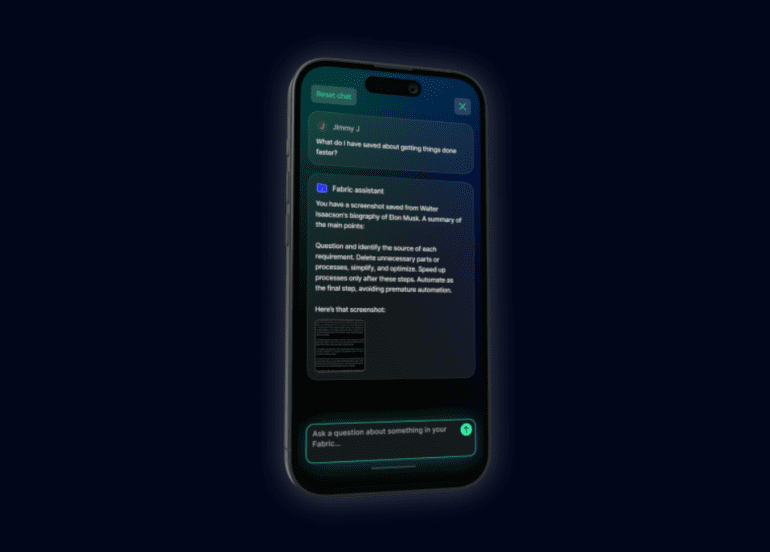TL;DR:
- Fabric, a startup founded in 2022, introduces an AI-powered workspace and information hub.
- It offers a versatile system for organizing and retrieving various types of digital information, including text-based documents, images, links, and more.
- Fabric allows collaborative document editing and communication within shared spaces.
- Its AI chatbot, Fabric Assistant, assists in natural language queries for information retrieval.
- Fabric employs a suite of AI technologies, including OpenAI’s Whisper and its proprietary “unwrap engine” for file type recognition.
- Security is a priority, with data encryption in transit and at rest, and plans for a security audit.
- Fabric targets the “prosumer” demographic and offers multi-tier pricing plans, ranging from $6 to $50 per month.
- The startup has secured $1 million in a pre-seed round led by Seedcamp, with participation from Acequia Capital and other angel investors.
Main AI News:
In the ever-evolving landscape of personal productivity tools, a new player has entered the field. Meet Fabric, a startup founded in 2022 by London-based software engineer Jonathan Bree, which has set out to revolutionize the way we manage our digital information. Fabric introduces an AI-powered service that serves as both a filesystem and a workspace for all your documents and files, coupled with an AI assistant that makes information retrieval a breeze.
While there are existing tools like Google’s Bard AI, which integrates with Google apps, and Rewind, which records computer usage, Fabric takes a different approach. It operates on an opt-in basis and is compatible with a wide range of file types and uploads, going beyond just Google apps. It currently supports text-based documents, images, bookmarks, internet content with links, and has plans to incorporate audio and video support. Additionally, Fabric offers seamless integration with various cloud services, making it a versatile solution for users.
Fabric’s inception was rooted in the idea of creating a collaborative web browser, and this concept has found a home within the platform. Users can create shared spaces for collaborative document editing and communication. These spaces can be utilized for sharing project files, planning trips, gathering inspiration, reviewing designs, and more, resembling the functionality of web browser Arc’s shared folders and spaces.
Using Fabric is a straightforward process. Users can upload individual files or folders, add links, or compose text notes directly within Fabric’s interface. The built-in search function simplifies information retrieval, and the AI chatbot, Fabric Assistant, can assist users in finding information through natural language queries, even if you can’t recall the exact file name.
Fabric’s engine is powered by a suite of approximately a dozen AI technologies, including OpenAI’s Whisper for audio recognition and AI models from Anthropic, among others. The company also developed its proprietary “unwrap engine” to identify file types and apply the appropriate tools for the task at hand.
Fabric aims to create a universal format for all your information, offering a futuristic desktop-like workspace where everything is easily accessible and shareable. While it includes search functionality, it differentiates itself from traditional data search engines, aligning more closely with a product like Dropbox, but with enhanced capabilities.
Security is a top priority for Fabric, with all data being encrypted in transit and at rest, following a model similar to Dropbox. The company plans to conduct a security audit as it expands its service to include more connections to services such as Google Drive and Notion.
Fabric is available through various platforms, including the web, browser extensions, desktop applications, and native mobile apps. It targets the “prosumer” demographic, catering to researchers, creatives, and power users who frequently switch between tasks and projects, offering them a centralized hub for managing their scattered information.
Fabric is now open to early adopters, with multi-tier plans ranging from $6 per month for 500GB to $50 per month for 4TB, offering flexibility and scalability to users. The startup, comprising a remote team based in the U.S. and the U.K., has already secured $1 million in a pre-seed round led by Seedcamp, with participation from Acequia Capital and other angel investors, including individuals with AI expertise from companies like Figma.
Conclusion:
Fabric’s innovative AI-powered workspace and information hub address the growing need for efficient data management and retrieval in an increasingly digital world. By providing a versatile solution for individuals and teams, Fabric is well-positioned to disrupt the personal productivity tools market and cater to the demands of a diverse user base. With robust security measures and flexible pricing plans, Fabric has the potential to become a go-to platform for professionals seeking streamlined information organization and accessibility.

